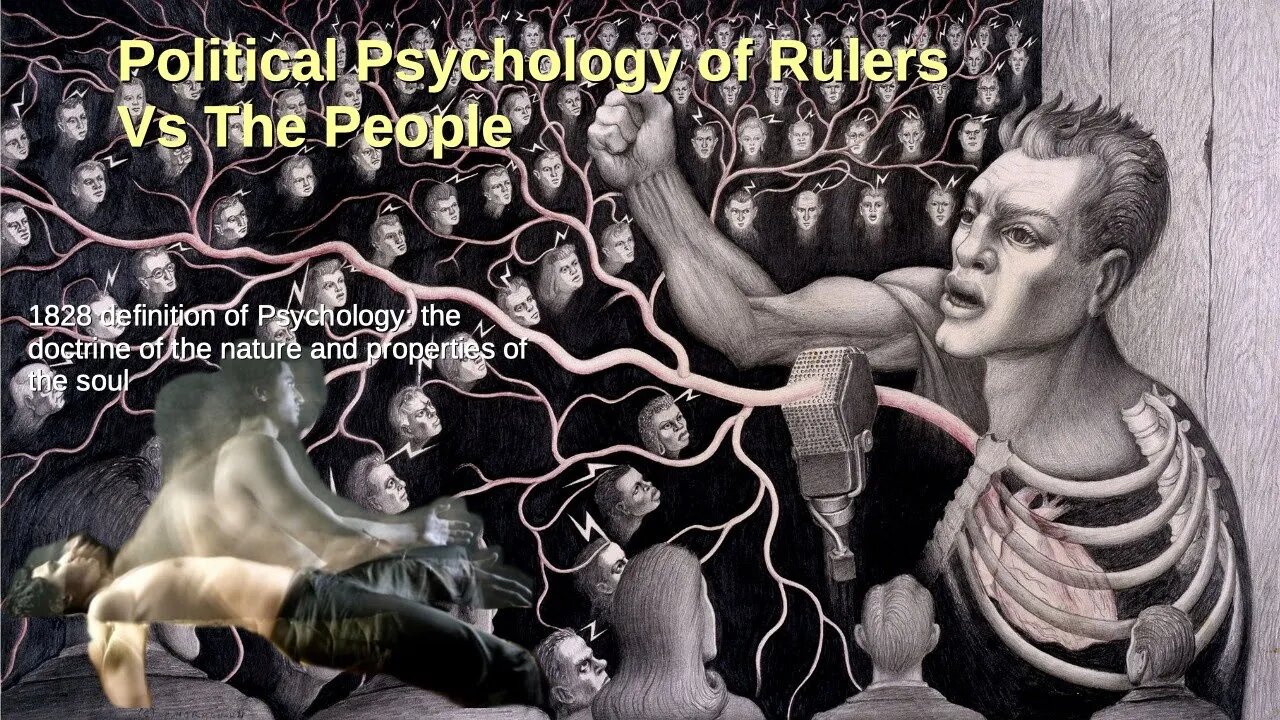Premium Only Content

Episode 398: Political Psychology of Rulers Vs. The People
Read full description and references at: https://bit.ly/3neAATZ
Political psychology of rulers vs the people has been and is the war of centuries not only from colonial American times but since before Noah. At first I was going to say it is more prevalent in our present day but then I had to consider Genesis 6:5-12. Verse 5 sets the scene not only of mans early history but of our present, ‘And God saw that the wickedness of man was great in the earth, and that every imagination of the thoughts of his heart was only evil continually.’
Tucker Carlson Note: not to distract – but:
This week, political psychology is in persist with high effect considering the Tucker Carlson fiasco. I have spoken of the collusion of corporatism on other programs. ‘A former US Army psychological warfare officer says that Tucker Carlson was fired by Fox News because of the regime’s agenda to maintain an “uninformed semi lobotomized quasi retarded population.”’ - and by removing a voice of reason, the political rulering oligarchs affect elections and legislation: Inside Story of Fox News Purge.
These nefarious activities are nothing new, here we are continuing to experience what Jonathan Edwards wrote with my opening modernization in bold italics,
‘MR. WILLIAMS (the colluding of government and corporatism) endeavors to support his own opinion, and to confute the book he pretends to answer, by the following methods.
1. By frequently misrepresenting what I say, and then disputing or exclaiming against what he wrongfully charges as mine.
2. By misrepresenting what others say in their writings, whose opinions he pretends to espouse.
3. By seeming to oppose and confute arguments, and yet only saying things which have no reference at all to them, but relate entirely to other matters, that are altogether foreign to the argument in hand.
4. By advancing new and extraordinary notions; which are both manifestly contrary to truths and also contrary to the common apprehensions of the Christian church in all ages.
5. By making use of peremptory and confident assertions, instead of arguments.
6. By using great exclamation, in the room of arguing; as though he would amuse and alarm his readers, and excite terror in them, instead of rational conviction.
7. By wholly overlooking arguments, and not answering at all; pretending, that there is no argument, nothing to answer when the case is manifestly far otherwise.
8 By frequently turning off an argument with this reflection, that it is begging the question; when there is not the least shew or pretext for it.
9. By very frequently begging the question himself, or doing that which is equivalent,
10. By often alleging and insisting on things in which he is inconsistent with himself.’
See Reference #9 for the full explanation of Edwards comments but, understand that all that is before us now is not new. And to prove what Tucker says in his recent Twitter comments, ‘Who will remember it five years from now.’ As proven here, that the works of Edwards have almost completely been forgotten except in Reformed Christian settings.
Continue from the beginning:
Political psychology of rulers vs the people, with the ‘imagination of the thoughts of his (mankind's) heart was only evil continually,’ I was compelled to further delve into political psychology through evaluating mankind’s present nature visa via a look at the shifting of language and thinking, even in the relationship of political rulers verses the people.
First and foremost we need to understand the major shift in the definition, the meaning, of psychology. I can speak to this topic because I do have a degree and background in behavioral science as well as studies in the Biblical understanding of humanity. With that established, Websters 1828 dictionary defines psychology as:
PSYCHOL'OGY, noun [Gr. soul, and discourse.] A discourse or treatise on the human soul; or the doctrine of the nature and properties of the soul.
Now we have to define the human soul. Again from Websters 1828 dictionary:
SOUL, noun
1. The spiritual, rational and immortal substance in man, which distinguishes him from brutes; that part of man which enables him to think and reason, and which renders him a subject of moral government. The immortality of the soul is a fundamental article of the christian system. Such is the nature of the human soul that it must have a God, an object of supreme affection.
Let me contrast the Foundational definition of psychology with its modern understanding from the New Oxford American Dictionary:
Read the rest at: https://bit.ly/3neAATZ
-
 45:53
45:53
Samuel Adams Returns
1 year agoEpisode 445: The Assassination of the Declaration, the Constitution, The Citizenry and Truth
64 -
 15:04
15:04
GritsGG
13 hours agoHow the Rank 1 Player Warms Up on Warzone Before Stream!
3.53K -
 1:54:43
1:54:43
Side Scrollers Podcast
17 hours agoVoice Actor ROASTED For Racist Double Standard + Influencer FELONY After Con Threat | Side Scrollers
21.4K7 -
 11:03
11:03
The Pascal Show
17 hours ago'THAT BABY IS GONE!' Neighbors Break Silence On Emmanuel Haro Case... Wildlife Took Remains?!
4.41K -
 LIVE
LIVE
Lofi Girl
2 years agoSynthwave Radio 🌌 - beats to chill/game to
283 watching -
 2:54:09
2:54:09
Badlands Media
14 hours agoDEFCON ZERQ Ep. 007: Flynn, Q Signals, and the Venezuela Strike
111K57 -
 2:29:05
2:29:05
FreshandFit
5 hours agoOwen Shroyer leaves Alex Jones But Here's the Truth!
18.6K18 -
 2:04:10
2:04:10
Inverted World Live
10 hours agoJapanese Memory Eraser | Ep. 101
105K19 -
 2:42:52
2:42:52
TimcastIRL
8 hours agoTrump To Deploy National Guard To Chicago, Baltimore, Democrats Call To Resist | Timcast IRL
223K98 -
 3:22:30
3:22:30
Laura Loomer
9 hours agoEP141: Muslims Call For Political Assassinations At Michigan Palestinian Conference
56.5K36